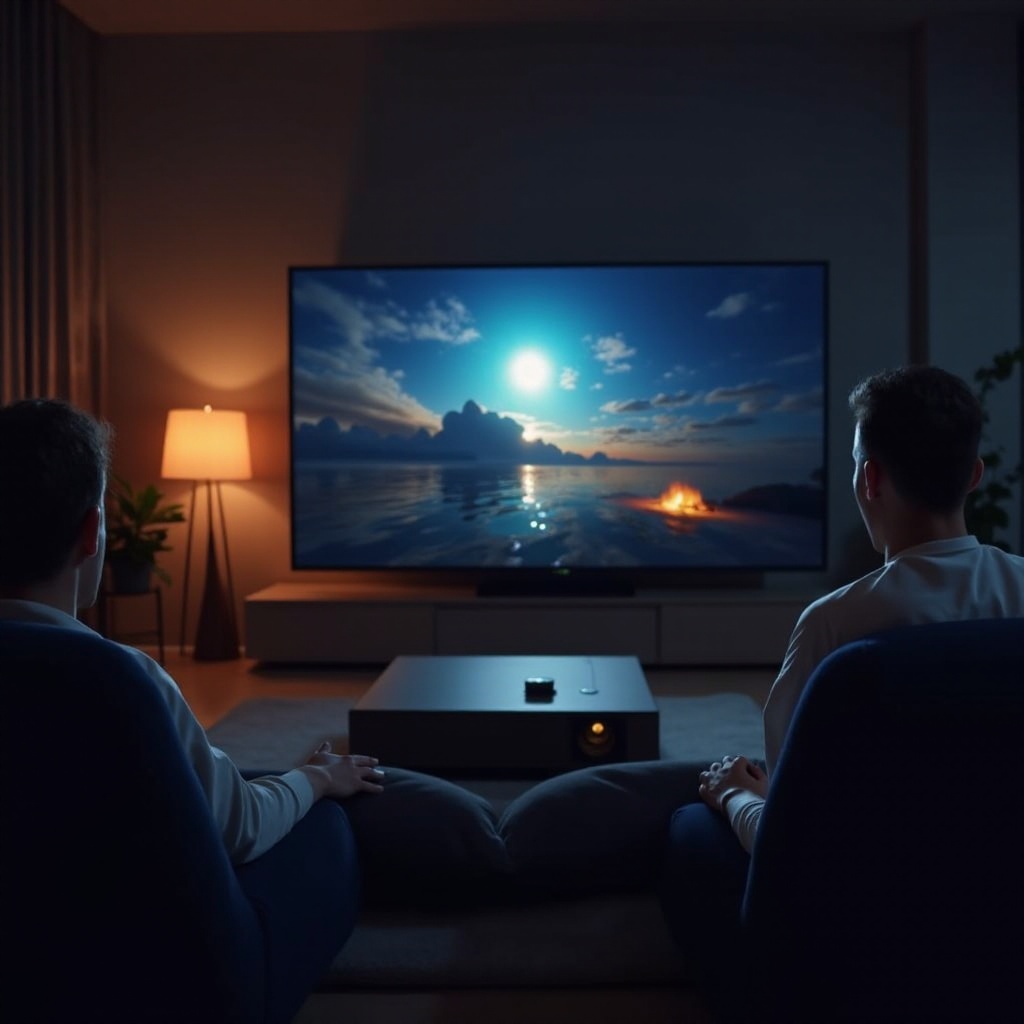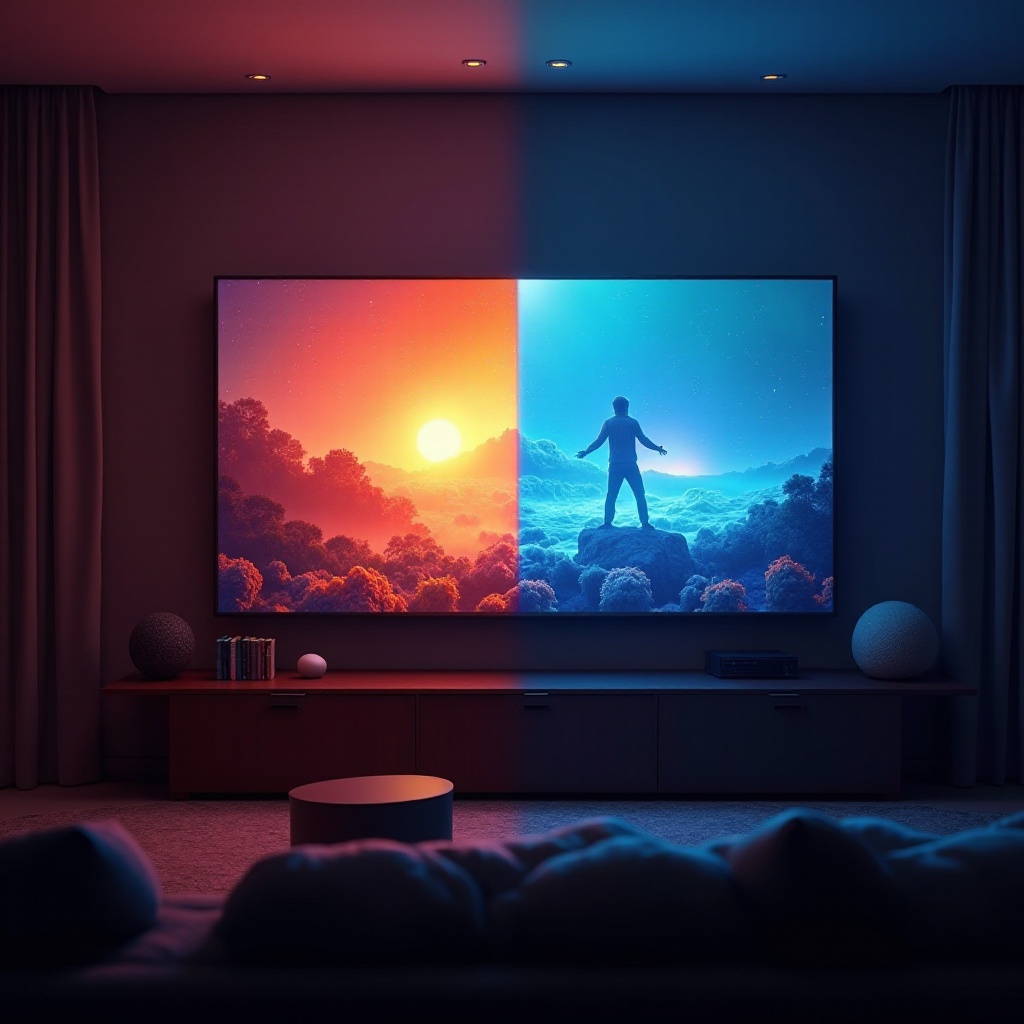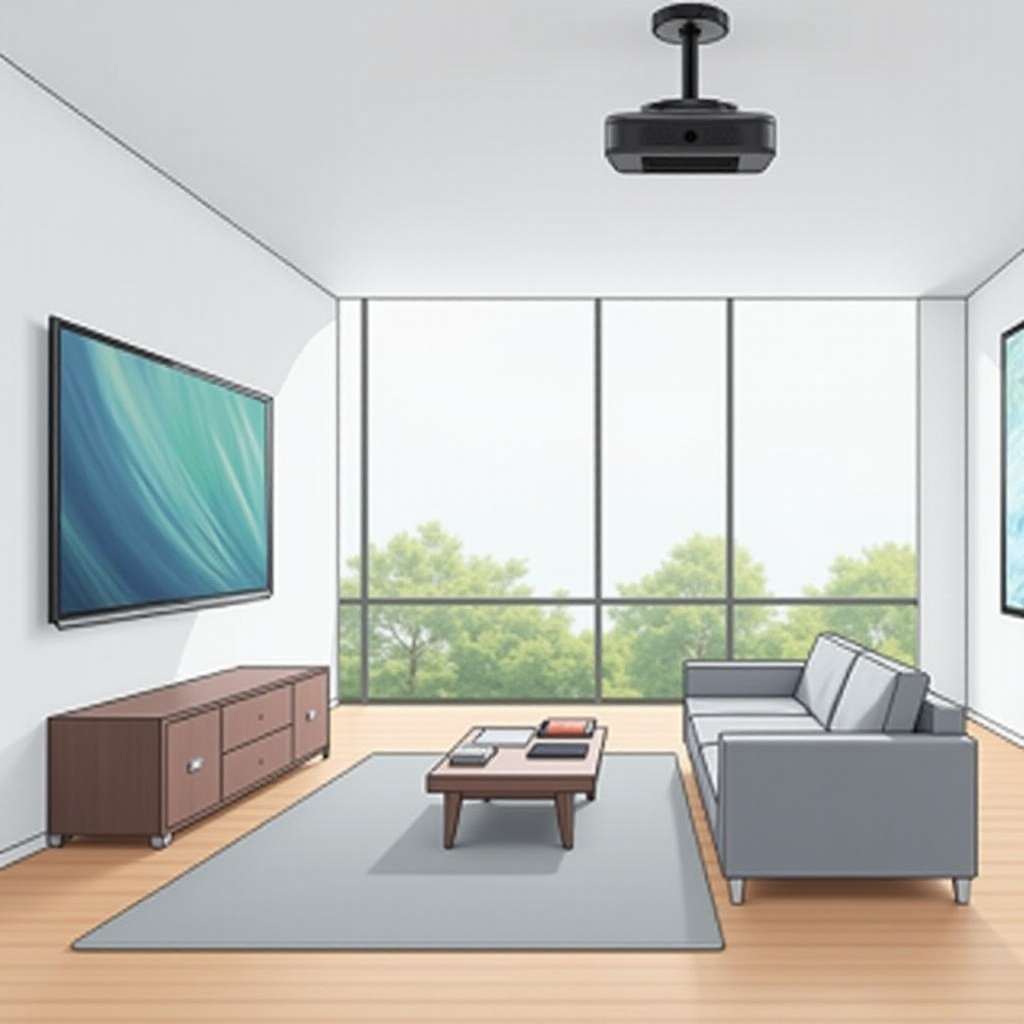Introduction
Creating the ultimate home theater experience requires careful consideration, and choosing between a projector and a TV can be challenging. Both options come with distinct advantages, and understanding these pros and cons can help you make an informed decision for your home theater setup. This guide will compare picture quality, viewing experience, installation, cost, and usability of projectors and TVs to determine which suits your needs better.

Picture Quality Comparison
Picture quality is crucial for any home theater. Evaluating resolution, contrast, color accuracy, brightness, and how they perform in different lighting conditions will guide you towards the right choice.
Resolution and Clarity
TVs generally offer higher native resolutions, ranging from HD to 8K. This consistency provides sharp and clear images, with high-end TVs ensuring a crisp picture with lifelike detail.
Projectors also support high resolutions, including 4K, but the quality can vary depending on the projector’s capabilities and screen size. A larger screen may reduce the perceived sharpness compared to a smaller TV.
Contrast and Color Accuracy
High-quality TVs produce excellent contrast and color accuracy, consistently delivering vibrant images. OLED and QLED TVs offer superior black levels and color ranges, enhancing the viewing experience.
Projectors can reproduce good contrast and color accuracy, but this heavily depends on the model and screen material. Modern projectors with high contrast ratios and color accuracy can rival TVs, but optimal performance often requires a controlled viewing environment.
Brightness and Lighting Conditions
TVs typically have higher brightness levels, which is advantageous in brightly lit rooms, ensuring that the picture remains clear even during daylight.
Projectors may struggle in bright environments as their image can be washed out. However, using blackout curtains or a dedicated home theater room can mitigate this issue. High-lumen projectors also help in improving image visibility in ambient light.

Viewing Experience
Your viewing experience is another vital factor. Screen size, immersiveness, and ideal viewing distance all play roles in determining whether a projector or TV is more suitable.
Screen Size Differences
TVs commonly range from 32 inches to over 85 inches. This size is often sufficient for most living rooms and provides an excellent and immersive viewing experience.
Projectors can offer much larger screens, reaching over 300 inches, creating a true theater-like experience. This scale is ideal for larger rooms or dedicated home theaters.
Immersiveness and Field of View
A larger screen can make viewing more immersive. Projectors shine here, as the expansive screen fills more of your field of view, drawing you into the action.
TVs provide a highly immersive experience within their size range, but they can’t match the sheer scale offered by projectors.
Ideal Viewing Distance
Ideal viewing distance depends on screen size and resolution. For TVs, sitting too close can reveal pixelation. Generally, around 1.5 to 2.5 times the diagonal size of the screen is recommended for optimal viewing.
Projectors allow more flexibility with ideal viewing distance. The larger screen means you can sit further back while still enjoying detailed images, making it suitable for larger spaces.
Installation and Space Requirements
Understanding the installation processes and space needs for both projectors and TVs is crucial for a smooth setup.
Projector Setup and Installation
Installing a projector can be more complex. You’ll need to mount the projector, ensure it aligns with the screen, and deal with wiring. Some models require additional setup for speakers. Proper placement of the lens and screen setup is essential for optimal image quality.
Space Considerations
Projectors excel in larger spaces. They require some distance to project a large image and are ideal for dedicated theater rooms. You’ll also need to factor in ceiling or wall mounting and the space for an appropriate screen.
TVs are more straightforward. They can be wall-mounted or placed on a stand, fitting neatly into various room sizes without major space reconfiguration.
Portability and Adaptability
Portability is where projectors have an edge. They can be easily moved and adapted for different setups, such as outdoor movie nights or temporary home theater setups.
TVs are generally more stationary. Moving them requires more effort, and they aren’t as adaptable to varied viewing environments.

Cost and Maintenance
Financial considerations and upkeep are also important when choosing between a projector and a TV.
Initial Purchase Costs
TVs typically have a higher upfront cost, especially for larger screens and premium technologies like OLED or QLED. However, prices can vary widely based on size and features.
Projectors often have a lower initial cost, especially DIY models. High-end projectors can rival TVs in price, but budget options provide large screen experiences at a lower initial investment.
Long-term Maintenance
TVs generally require less maintenance. Solid-state components minimize the need for regular upkeep. However, issues with pixels or backlights can arise over time.
Projectors demand more maintenance. Bulb or lamp replacement is common, depending on usage. Laser projectors offer longer lifespans but come at higher initial costs. Regular cleaning to avoid overheating is also required.
Cost-effectiveness Over Time
Assessing cost-effectiveness involves looking at the initial investment and ongoing costs. TVs, with less maintenance, can be cheaper long-term. However, projectors offering large screens at lower upfront costs might be a better deal despite additional maintenance.
Usability and Additional Features
Day-to-day use and extra features can make a significant difference in your decision-making process.
Ease of Use
TVs are generally easier to use. They come ready out of the box with minimal setup. Just plug in, and you’re ready to go.
Projectors involve more steps in setup and operation, such as aligning the image and connecting audio equipment. They can be more cumbersome for everyday use.
Smart Features and Connectivity
Modern TVs come with a range of smart features. Built-in apps, internet connectivity, and voice control make them versatile entertainment hubs. Connectivity options are abundant, with multiple HDMI ports and wireless options.
Projectors are catching up with smart features, but many still require external devices for streaming and connectivity. This can add to the setup complexity but also offers flexibility.
Versatility for Different Uses
Projectors offer great versatility. They can be used for movies, sports, presentations, and gaming. Their portability makes them suitable for various environments.
TVs, with built-in smart features and connectivity, serve as comprehensive entertainment centers. They readily handle multiple tasks from streaming, gaming to internet browsing.
Conclusion
Choosing between a projector and a TV for your home theater depends on your specific needs. Consider factors such as picture quality, viewing experience, installation, cost, and usability. Both options have unique benefits and potential drawbacks. Assessing these aspects in line with your priorities will help you make an informed decision, ensuring you create a home theater experience you’ll enjoy for years.
Frequently Asked Questions
Which is better for a small room, a projector, or a TV?
For small rooms, a TV is often more practical due to less space requirement and higher brightness levels, functioning well in any lighting.
Are projectors good for gaming compared to TVs?
Projectors can be good for gaming, especially those with low input lag. However, high-quality TVs are generally better for gaming with faster response times and better brightness.
How long do projector bulbs typically last?
Projector bulb life varies, usually between 2,000 to 5,000 hours for traditional bulbs. Laser projectors offer longer lifespans, often up to 20,000 hours.